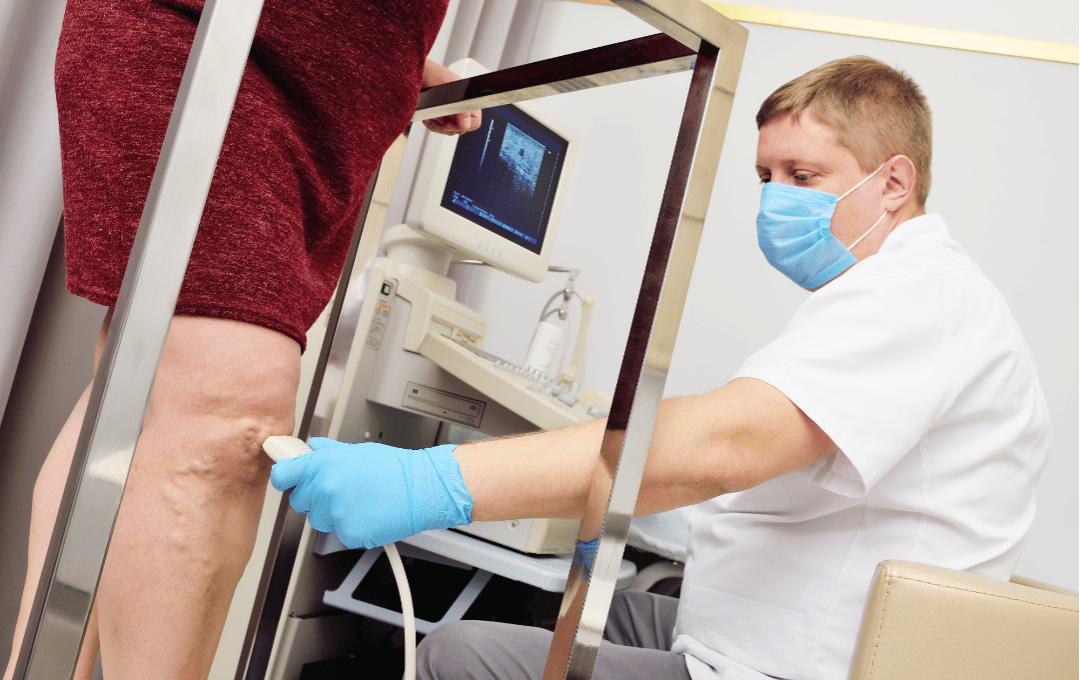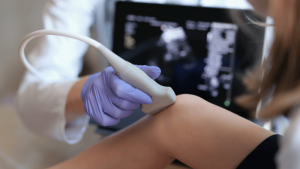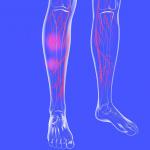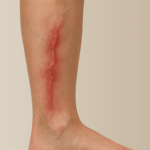
Chronic venous insufficiency (CVI) is a condition in which the valves in the leg veins do not function properly, making it challenging for blood to flow back up to the heart. This causes blood to pool in the legs, leading to swelling, pain, skin changes, and the development of visible varicose veins. A chronic venous insufficiency test can detect these issues by measuring blood flow and confirming a diagnosis, which is essential for understanding the severity of the vein disease and developing a precise treatment plan.
Testing is an essential step in identifying vein disease early and developing an effective treatment plan.
How Venous Insufficiency Is Diagnosed
If you’re wondering how to diagnose venous insufficiency, the process begins with a consultation. When visiting USA Vein Clinics, our experienced vein doctor specialists will perform a test for venous insufficiency, which includes reviewing your medical and family history, followed by a physical exam and medical imaging to assess how well blood flows through your veins.
Common Venous Insufficiency Tests Used for Diagnosis
The most reliable and standard method for diagnosis is a venous insufficiency ultrasound. Also known as a Doppler Ultrasound, this non-invasive imaging test utilizes sound waves, enabling vein specialists to visualize blood flow, measure the diameter of blood vessels, and detect blockages.
What to Expect During a Venous Disease Diagnosis
When visiting USA Vein Clinics for a venous disease diagnosis, our patients will receive, as part of their consultation:
- In-office evaluation with an expert vein specialist
- Ultrasound scan to assess vein health
- Post-evaluation discussion where the doctor reviews results and recommends next steps
How long does a venous insufficiency ultrasound take?
A venous insufficiency ultrasound is a non-invasive procedure that typically lasts between 30 and 60 minutes.
Next Steps After Venous Disease Diagnosis
Following a diagnosis, the vein specialist creates a customized, minimally invasive plan for a venous insufficiency procedure to restore healthy circulation. To restore healthy circulation and relieve your symptoms, we offer several highly effective, minimally invasive, office-based treatments:
- Endovenous Laser Therapy (EVLT): Uses laser energy to close diseased veins.
- Ultrasound-Guided Sclerotherapy: Collapses veins with a specialized solution.
- Radiofrequency Ablation (RFA): Treats affected veins using heat energy.
- Varithena® Foam Treatment: Targets larger varicose veins with foam.
All of these vein treatments are highly effective in relieving symptoms while also restoring healthy circulation. A vein specialist will recommend the option best suited to each patient’s individual condition.
Understanding the Diagnosis: Venous Insufficiency vs. Chronic Venous Insufficiency
Venous insufficiency simply means blood isn’t flowing correctly through your veins.
However, chronic venous insufficiency (CVI) is a specific, long-term condition that develops gradually over time as vein valves fail.
Persistent symptoms, such as leg swelling, heaviness, skin discoloration, or ongoing pain, may be signs of CVI. An ultrasound is used to measure blood flow, confirm the diagnosis of CVI, and assess the severity of this chronic condition.
Since CVI can progress without targeted medical treatment, early and accurate testing is essential to ensure the best care options and improve your overall quality of life.
When Should You Get Tested for Chronic Venous Insufficiency?
It is easy to dismiss leg discomfort as a typical part of aging, but persistent symptoms may point to a more serious vein condition. Knowing when to get tested for chronic venous insufficiency (CVI) helps with early detection, as untreated vein disease can lead to further complications.
You should consider a chronic venous insufficiency test if you experience:
- Aching or heavy legs
- Persistent swelling in your lower legs or ankles
- Skin changes or darkening near your ankles
- Bulging or visible varicose veins
Getting a chronic venous insufficiency test at the first sign of these symptoms gives you the best chance to manage discomfort effectively and prevent further progression.
Do I Need a Referral to Get Tested for Vein Disease?
A referral is typically not required to schedule an appointment at USA Vein Clinics. You can book directly with a vein specialist at one of our nationwide clinics, even if you’re not currently seeing a primary care provider. To book an appointment, you can use our online scheduling tool or call 888.768.3467 to speak to a member of our team who will be happy to assist you with any questions you may have.
Will Insurance Cover My Chronic Venous Insufficiency Test?
USA Vein Clinics offers affordable care while helping patients navigate their insurance coverage. Since varicose and spider veins are symptoms of vein disease, most insurance plans, including Medicare and Medicaid, typically cover testing and treatment. Any out-of-pocket cost depends on the specific plan, the type of procedure, and whether the patient chooses in-office or telemedicine appointments.
Our care team members can provide guidance throughout every step of the approval process to avoid delays in a chronic venous insufficiency test or treatment due to financial concerns.
Get the Answers & Care You Need at USA Vein Clinics
Anyone experiencing symptoms of CVI should not wait for their symptoms to worsen. Schedule a chronic venous insufficiency test at USA Vein Clinics with an experienced vein specialist who can offer an accurate diagnosis and personalized treatment plan.






